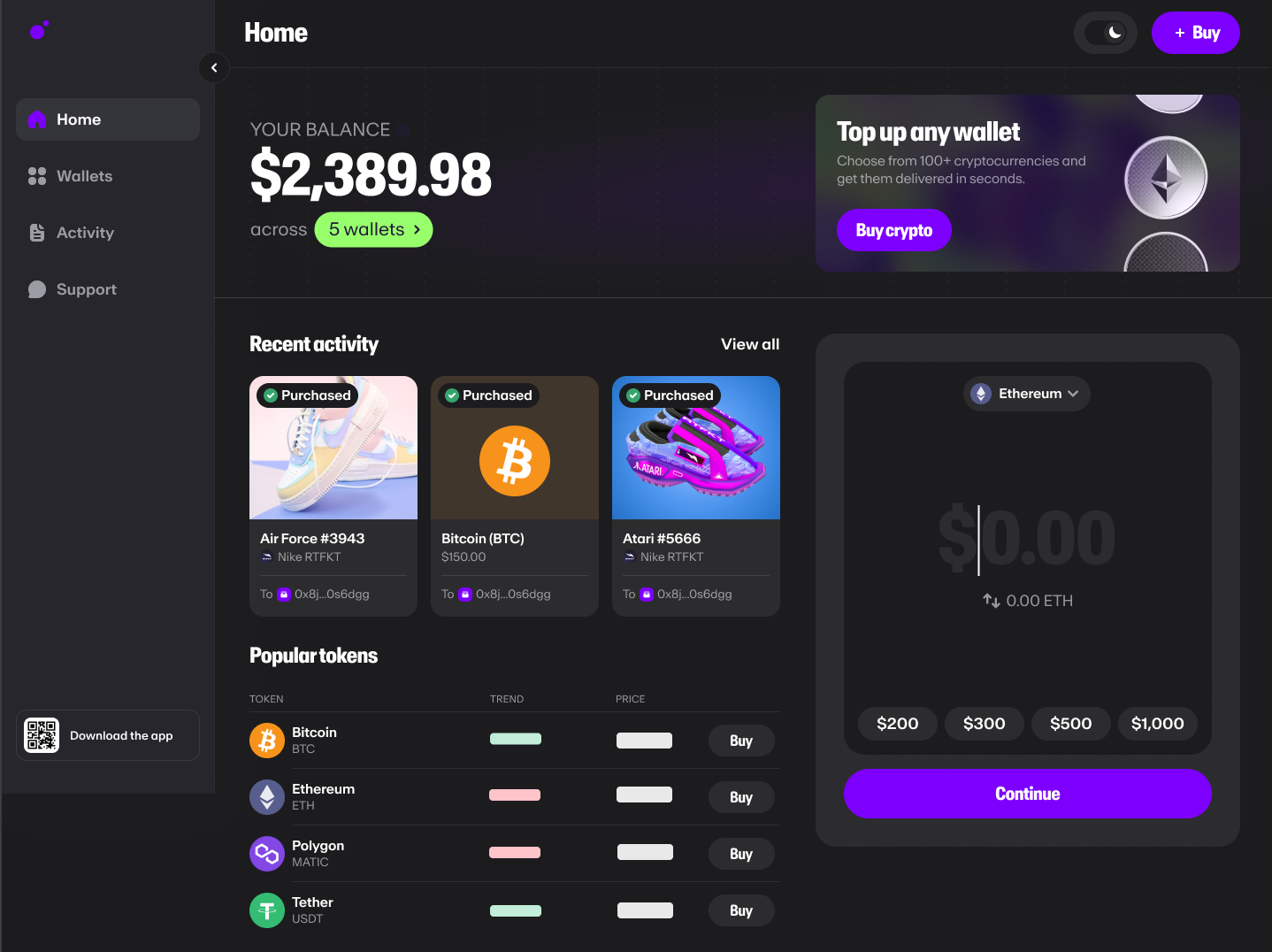Finance décentralisée ou DeFi fait référence aux services financiers opérant sur un réseau blockchainpeer-to-peer, avec peu ou pas de dépendance à une entité centrale.
Contrairement aux services financiers traditionnels accessibles aux clients selon des critères spécifiques, les applications de DeFi (dApps) sont ouvertes à toute personne ayant une connexion internet.
À la suite de ses cas d'utilisation et de ses avantages, le écosystème DeFi a rapidement grandi et il est devenu difficile de suivre tous les projets émergents.
Cet article répertorie certaines solutions DeFi utiles pour vous aider à naviguer facilement dans l'écosystème.
Projets d'infrastructure dans DeFi

Les projets d'infrastructure englobent tous les cadres, protocoles et technologies sous-jacentes nécessaires pour créer et lancer applications décentralisées (dApps). Les projets d'infrastructure peuvent être divisés en plusieurs sous-catégories :
Blockchains de couche-1
blockchains Layer-1 sont livres distribués qui stockent des enregistrements de transactions sur un réseau d'ordinateurs spéciaux, appelés nœuds, au lieu d'un serveur centralisé. Ils utilisent la cryptographie pour sécuriser ces enregistrements et garantir leur immuabilité. Ils constituent également l'infrastructure de base pour l'écosystème DeFi.
- Ethereum: Ethereum a été la première blockchain à supporter les contrats intelligents, étendant l'utilisation des blockchains bien au-delà des réseaux de paiement peer-to-peer.
- Solana: Solana est l'une des blockchains les plus évolutives car elle utilise un Mécanisme de consensus basé sur la preuve d'enjeu, lui permettant de traiter plus de 65 000 transactions par seconde (TPS), chaque transaction coûtant moins de 0,01 $.
- Chaîne BNB: La chaîne BNB est une combinaison de la chaîne phare de Binance et de la Binance Smart Chain (BSC). Elle vise à créer une infrastructure qui permet l'interopérabilité afin de pouvoir supporter des applications à grande échelle.
- Cosmos: Cosmos se définit comme l'internet des blockchains. Il se compose d'un écosystème en constante expansion de blockchains qui se connectent en utilisant le protocole de communication Inter-Blockchain (IBC).
Blockchains supplémentaires de couche-1
Cette liste n'est pas exhaustive, mais certaines autres blockchains de couche-1 populaires incluent :
Les blockchains de couche 2 et les chaînes latérales
Les solutions de couche 2 sont des blockchains qui offrent une couche plus évolutive pour l'exploitation des protocoles DeFi tout en tirant parti de la sécurité du réseau Ethereum.
- Polygone: Polygone est une Ethereum Virtual Machine (EVM)-sidechain compatible Ethereum qui permet aux utilisateurs de créer des dApps évolutives et conviviales avec des frais de transaction réduits.
- Optimisme: Optimisme est un « rollup optimiste » qui aide à développer des solutions DeFi évolutives. Il y parvient en traitant les transactions hors de la chaîne principale, puis en empaquetant (roulant) les données de toutes les transactions vérifiées pour les envoyer sur le réseau principal Ethereum.
- ArbitrumArbitrum est une autre solution de couche 2 qui utilise la technologie de rollup optimiste pour augmenter l'évolutivité de la blockchain Ethereum.
- zkSync: zkSync est un rollup à connaissance zéro (ZK) qui utilise un type spécial de preuve de connaissance zéro appelé zkSNARK pour permettre des transactions à faible coût de gaz et à haute vitesse sur les protocoles DeFi.
- Starknet: Starknet est un ZK rollup construit par Starkware qui utilise zkSTARK des preuves pour offrir des transactions rapides, bon marché et sécurisées.
Services de tokenisation d'actifs
Les services de tokenisation d'actifs aident à créer des représentants numériques sous forme de token d'éléments physiques ou numériques. Ces tokens sont stockés sur la blockchain et ont ainsi une identité et une rareté immuables et vérifiables.
Veuillez garder à l'esprit que certains actifs sont fortement réglementés et que les offrir sur une blockchain ne change pas leur statut réglementaire.
- Tokeny: Tokeny vous permet de tokeniser des dettes, des fonds, des capitaux privés, et immobilier facilement.
- PolymathPolymath est une plateforme qui aide à créer et gérer des tokens de sécurité conformes aux réglementations.
- CodeFiCodeFi est une plateforme de tokenisation d'actifs numériques de bout en bout, d'émission et de gestion du cycle de vie pour des produits financiers comme les obligations et les fonds.
- VertaloVertalo aide à tokeniser des actifs privés comme l'immobilier et les infrastructures afin qu'ils puissent être inscrits et échangés publiquement sur les échanges crypto.
- OpenLaw Finance: OpenLaw Finance crée des options d'achat d'actions tokenisées que vous pouvez distribuer aux employés en fonction d'un calendrier d'acquisition.
- Dibbs: Dibbs est une plateforme de tokenisation en tant que service (TaaS) qui aide Web2 et Web3 entreprises à tokeniser leurs actifs physiques.
Services de données
Les services de données sont une partie cruciale de l'infrastructure DeFi. Pour mieux comprendre les plateformes de services de données, nous les divisons en quatre sous-catégories.
Stockage et informatique
Stockage décentralisé fonctionne de manière similaire au stockage centralisé — vous téléchargez des fichiers via Internet sur un serveur et si vous avez besoin de récupérer le fichier, vous envoyez une demande au serveur.
Au lieu de dépendre d'un serveur centralisé, cependant, les solutions de stockage décentralisé, tout comme les blockchains, s'appuient sur plusieurs ordinateurs pour créer un serveur distribué.
- Areweave: Areweave est un système de stockage décentralisé qui fonctionne comme un disque dur collectivement possédé. Il rend la permanence de l'information durable grâce à des sauvegardes continues.
- Filecoin: Filecoin utilise cryptographiques des preuves cryptographiques pour garantir que vos données restent disponibles et inchangées au fil du temps. Le réseau crée également des stratégies pour répondre à vos besoins en matière de redondance, de vitesse de récupération et de coût.
- Storj: Storj vous permet de stocker vos données en ligne en toute sécurité sur plus de 13 000 nœuds et de les récupérer facilement quand vous en avez besoin.
Indexation
Blockchains sont des registres qui maintiennent un enregistrement public de toutes les transactions. Pour que les applications DeFi obtiennent cette information de manière organisée, cependant, elles ont besoin de services d'indexation, qui sont des scripts informatiques permettant de rechercher des informations dans une blockchain.
- The Graph: The Graph est une plateforme d'indexation décentralisée qui vous permet de traiter, indexer, afficher et utiliser des données provenant de blockchains en utilisant des API ouvertes appelées Subgraphs.
- Aleph.im: Aleph.im est un indexeur agnostique de blockchain qui permet à votre dApp accéder aux données on-chain avec seulement quelques lignes de code.
Oracles
Les blockchains sont des systèmes hautement efficaces mais elles ne peuvent pas communiquer ou comprendre les données provenant de l'extérieur de leur écosystème. Oracles sont des logiciels qui aident les blockchains à récupérer des données du monde extérieur et à prendre des décisions sur la base de ces données.
- Chainlink: Chainlink est la plateforme d'oracle la plus populaire. Il vous permet de construire des APIs externes qui se connectent à contrats intelligents et obtenez des données infalsifiables sur n'importe quel événement du monde réel.
- Band Protocol: Band Protocol est un oracle open-source qui fournit des données fiables à DeFi et d'autres services sur la blockchain.
- DIA: DIA puise dans les données des échanges de crypto vivant sur différentes blockchains. Et il sert à la fois couche-1 et couche-2 réseaux.
- ZapOracles: ZapOracles permet aux protocoles DeFi d'accéder aux données hors chaîne via des requêtes ou des abonnements.
Protocoles de communication
Protocoles de communication aider les développeurs DeFi à envoyer des notifications push aux utilisateurs de leur dApp, améliorant ainsi l'expérience utilisateur et incitant les utilisateurs à passer plus de temps sur leur plateforme.
- Protocole Push: Le Protocole Push, précédemment connu sous le nom de Service de Notification Push Ethereum (EPNS), a été le premier Web3 protocole de notification qui a permis aux protocoles DeFi d'envoyer des notifications push en temps réel aux utilisateurs pour des événements critiques tels que la liquidation de prêt, l'exécution de transactions, les largages, et plus encore.
- Alchemy Notify: Alchemy Notify permet aux protocoles DeFi d'envoyer des notifications push à leurs utilisateurs sur leurs smartphones.
Ponts inter-chaînes
Ponts inter-chaînes aident les utilisateurs à transférer des actifs entre différentes blockchains facilement. Ils améliorent l' interopérabilité de l'écosystème DeFi et donnent aux utilisateurs accès à plusieurs environnements blockchain avec un seul actif.
- Celer Bridge (cBridge): cBridge supporte le transfert de plus de 110 tokens sur plus de 30 blockchains.
- Synapse: Synapse permet de déplacer des actifs à travers plusieurs blockchains à grande vitesse et à faible coût.
- Li.Fi: LiFi est un agrégateur de ponts inter-chaînes qui regroupe plusieurs ponts de blockchain en une seule interface et crée une expérience de pontage fluide.
Rampes crypto
Les rampes crypto sont des services qui vous permettent de convertir des devises fiduciaires en crypto ou vice versa. Le premier est appelé un « rampe d'accès » « service tandis que le second est appelé un » « rampe de sortie » « service ».
« Les services de rampe d'accès et de rampe de sortie crypto sont importants car ils connectent les systèmes financiers traditionnels à l'écosystème DeFi et amènent plus d'utilisateurs dans le Web3 ».
- « MoonPay »« : MoonPay est un service de rampe d'accès et de sortie crypto non-custodial qui vous permet de » « acheter » « et » vendre 100+ cryptomonnaiesJe peux acheter des cryptomonnaies par carte, virement bancaire ou paiements mobiles comme Google Pay et Apple Pay.
- BVNK (anciennement Coindirect) : BVNK vous permet d'acheter et de vendre plus de 40 cryptomonnaies et de participer à paiements transfrontaliers dans un large éventail de pays.
- TransakTransak est un service de rampe d'accès et de sortie de cryptomonnaies qui permet à plus de 100 applications sur plus de 75 blockchains d'intégrer des utilisateurs de monnaie fiduciaire à la cryptomonnaie.
outils de développement DeFi
plates-formes de développement de protocoles offrent une large gamme de solutions de développement, de kits de développement logiciel et d'API pour créer des applications DeFi robustes.
- Alchemy: L'alchimie est une plateforme de développement fiable et évolutive avec une large gamme de SDK et d'API pour aider à créer des applications décentralisées.
- thirdweb: thirdweb propose un cadre de développement Web3 complet comprenant des API RPC très fiables, des SDK et des contrats intelligents prêts à être déployés. contrats intelligents.Moralis
- : Moralis est populaire pour ses API de qualité professionnelle et l'offre de données blockchain en temps réel aux applications décentralisées.Stablecoins
Stablecoins
. sont des actifs cryptographiques dont valeurs sont indexées sur la valeur d'un actif comme l'or, monnaie fiduciaire, ou d'autres cryptomonnaies. Ils offrent aux utilisateurs un moyen de rester dans l'écosystème des cryptomonnaies en détenant une cryptomonnaie qui a historiquement été moins volatile que beaucoup d'autres types de cryptomonnaies.
(Mais rappelez-vous que toutes les cryptomonnaies peuvent parfois être sujettes à la volatilité.)
La plupart des stablecoins populaires sont actuellement indexés sur le prix d'un dollar américain, se négociant ainsi à un ratio de 1:1 avec l'USD.
- Tether (USDT) : USDT est le stablecoin le plus populaire avec une capitalisation boursière de plus $24 milliards (au moment de l'écriture). USDT est disponible sur des blockchains comme Ethereum, Solana, EOS, et Tron.
- USD Coin (USDC): USDC est un stablecoin indexé sur le dollar américain qui est géré par Circle et Coinbase. USDC est disponible sur Ethereum (ETH), Algorand (ALGO) Avalanche (AVAX) Flow (FLOW) Solana (SOL) Stellar (XLM), et une gamme d'autres chaînes.
- DAI: DAI est un stablecoin décentralisé qui est soutenu par d'autres cryptomonnaies. Il est très populaire dans la DeFi comme monnaie de base pour les échanges.
Explorateurs de blockchain
Les explorateurs de blockchain sont des plateformes où les utilisateurs peuvent explorer une variété de données et d'informations liées à toutes les transactions qui se produisent sur une blockchain. Ils sont une partie cruciale de l'écosystème DeFi car les utilisateurs peuvent utiliser ces plateformes pour analyser les contrats intelligents, vérifier l'état des transactions et obtenir d'autres informations DeFi.
- Blockchain.com: Blockchain.com permet aux utilisateurs de vérifier les données sur les réseaux Ethereum et Bitcoin.
- Etherscan« : » Etherscan vous permet de rechercher des informations sur les blocs, les contrats intelligents et les transactions sur la blockchain Ethereum.
- Polygon Scan: Polygon Scan prend en charge les recherches de transactions Polygon.
- BscScan: BSC Scan permet aux utilisateurs d'explorer les activités de transaction sur la BNB Chain.
- CoinMarketCap: En plus d'offrir une vue d'ensemble de l'écosystème crypto, CoinMarketCap dispose également d'un explorateur blockchain multi-chaînes.
Pour en savoir plus sur l'explorateur de blockchain Etherscan, consultez notre article Qu'est-ce qu'Etherscan et comment l'utiliser ?
Conformité et identité
Les protocoles de conformité et d'identité aident à construire un écosystème DeFi plus sécurisé et permettent aux utilisateurs et protocoles de respecter les conformités réglementaires.
- Elliptic: Elliptic propose des analyses de blockchain, des formations et des certifications pour les entreprises de crypto, les institutions financières et les régulateurs.
- Civic: Civic est une plateforme de gestion d'identité numérique en ligne qui permet la vérification de l'identité des utilisateurs sur dApps, DAOs, ou DEXs.
- Chainalysis: Chainalysis est une plateforme de conformité et sécurité qui aide les protocoles DeFi, les entreprises et les gouvernements à rendre les utilisateurs et leurs fonds plus sûrs.
Investissements, marchés, et plateformes de liquidité dans DeFi

Échanges de cryptomonnaies
Échanges de crypto vous aider échanger monnaie fiduciaire en crypto ou échanger une crypto contre une autre. Il existe principalement deux types d'échanges : échanges centralisés et échanges décentralisés.
Échanges centralisés (CEX)
Échanges centralisés (CEXs) effectuent des transactions en votre nom et gèrent vos actifs par l'intermédiaire d'un portefeuille dépositaire.
- BinanceBinance est la plus grande plateforme d'échange de crypto-monnaies et vous permet de trader plus de 600 actifs cryptographiques.
- CoinbaseCoinbase figure parmi les plus grandes plateformes d'échange de crypto-monnaies aux États-Unis et est également très populaire dans d'autres parties du monde.
- KrakenKraken permet d'échanger plus de 185 cryptomonnaies via une interface conviviale.
- GeminiGemini est un CEX qui vous permet d'échanger des cryptomonnaies, de gérer des actifs et d'analyser vos transactions facilement.
- Crypto.comCrypto.com est une plateforme qui prend en charge le trading de presque toutes les cryptomonnaies et des dérivés comme les contrats à terme et perpétuels.
Échanges décentralisés (DEX)
Échanges décentralisés (DEXs) sont non-custodial plates-formes et elles vous permettent de garder un contrôle total sur vos actifs et transactions.
- Uniswap (V3): Uniswap (UNI) est un DEX multi-chaînes et l'option la plus populaire dans l'écosystème DeFi d'Ethereum.
- 1Inch: 1inch est un agrégateur de DEX qui analyse instantanément plusieurs DEXs pour optimiser les transactions et offrir les meilleurs taux de conversion.
- Bancor: Bancor vous permet de réaliser des échanges de jetons automatisés instantanés et de gagner des frais sur ces échanges. pools de liquidité.
- Balancer: Balancer est une plateforme de DEX et de gestion de portefeuille réunies en une seule. Il vous permet d'échanger des jetons et de routage automatique des échanges de jetons moins populaires à travers plusieurs pools pour réduire vos coûts de transaction.
- Curve: Curve n'accepte que les pools avec des actifs se comportant de manière similaire comme les stablecoins afin que vous puissiez échanger des jetons avec des frais bas et peu de slippage.
- QuickSwap: Quickswap est une DEX basée sur Polygon qui vous permet d'échanger des jetons pour des frais de gaz réduits. Polygon-based DEX that allows you to swap tokens pour des frais de gaz réduits.
Lending and borrowing
Les plateformes de prêt DeFi permettent aux emprunteurs d'obtenir des prêts en échange contre des garanties crypto sans passer par les procédures complexes associées aux prêts traditionnels.
Avec le prêt, vous pouvez déposer votre cryptomonnaie dans un pool de prêts et recevoir des jetons représentant votre part dans la valeur totale du pool.
Par la suite, quand quelqu'un emprunte depuis votre pool, vous pouvez gagner des intérêts dessus. Cependant, vous serez également soumis à certains risques associés à la mise en prêt de vos cryptomonnaies et vous devriez toujours faire vos propres recherches avant de prêter.
- Aave: Aave est une plateforme de prêt et d'emprunt décentralisée qui permet aux utilisateurs de participer en tant que fournisseurs ou emprunteurs.
- Compound: Compound est une plateforme de prêt favorable aux emprunteurs qui prétend offrir des taux d'intérêt équitables et donner aux utilisateurs la propriété de leur garantie.
- Yield Protocol: Yield Protocol prend en charge plusieurs types de garanties et permet aux utilisateurs d'emprunter des actifs avec des taux d'intérêt fixes pour une durée allant jusqu'à un an.
- Maple Finance: Maple Finance permet aux organisations d'obtenir des prêts sous-garantis pour optimiser leur fonds de roulement.
- Liquity: Liquity collecte des frais uniques minimes au lieu d’intérêts pour sanctionner un prêt contre ETH comme garantie.
Assurance
Les assurances DeFi peuvent offrir une protection contre les pertes potentielles dues à des accidents comme les exploits de contrats intelligents et les piratages. Contrairement aux assureurs centralisés qui pourraient prendre beaucoup de temps pour vérifier les réclamations, les assureurs décentralisés tiennent un vote ou utilisent des oracles tiers pour vérifier une réclamation dans les plus brefs délais.
- InsurAce: InsurAce protège plus de 130 protocoles et a déjà versé 11,6 millions de dollars en indemnités d'assurance. Vous pouvez contribuer à l'application et gagner des récompenses en vérifiant une réclamation, en jalonnant des pièces
- dans celle-ci, ou en fournissant des références.Nexus Mutual : Nexus Mutual aide à se protéger contre les attaques de contrats intelligents et les piratages d'échanges avec ses couvertures de contrats intelligents. La plateforme est dirigée par la communauté et toutes les réclamations sont vérifiées par les membres via des votes.
- Opium Assurance: Opium Assurance offre une protection contre de nombreux types de risques, y compris les risques de contrat intelligent, les événements de défaut de crédit, perte d'impermanence, etc.
- Solace: Solace offre une assurance contre les attaques courantes DeFi comme les attaques de réentrance, les erreurs de calcul et les attaques de prêts flash pour les organisations. Il offre également une option d'assurance de portefeuille pour protéger les individus contre les attaques.
- Nsure: Nsure est une plateforme d'assurance ouverte qui permet la sous-traitance des risques et la souscription.
- Union Finance: La prime d'assurance de Union Finance aide les utilisateurs à rembourser une partie de leur prêt afin qu'une plateforme de prêt DeFi ne liquide pas leurs garanties.
Encore une fois, vous devriez toujours faire vos propres recherches avant d'acheter une politique ou un produit d'assurance.
Gestion d'actifs

Les outils de gestion d'actifs aident à la gestion sécurisée des actifs crypto et permettent aux utilisateurs de surveiller la performance de leurs actifs grâce à une interface facile.
Portefeuilles crypto
A portefeuille crypto est une application logicielle utilisée pour stocker, envoyer et recevoir des actifs cryptographiques. En plus des portefeuilles de garde, il existe deux types principaux de portefeuilles crypto non-custodial : portefeuilles froids et portefeuilles chauds.
Portefeuilles froids
Portefeuilles froids sont généralement des appareils physiques qui stockent vos clés privées hors ligne pour les protéger contre le piratage ou le contrôle à distance.
- Ledger Nano: Les portefeuilles Ledger Nano vous permettent de stocker plus de 5 000 actifs cryptographiques et aussi échanger, staker, et les envoyer facilement en utilisant l'application Ledger Live
- .Trezor : Trezor portefeuilles matériels stockez vos clés hors ligne et utilisez une application de bureau pour gérer les actifs.
- NGRAVE: NGRAVE est un portefeuille froid qui affirme offrir le système d'exploitation le plus sécurisé certifié (EAL 7) au monde. Il est 100% hors ligne et ne prend pas en charge les connexions USB, WiFi ou Bluetooth.
Portefeuilles chauds
Contrairement aux portefeuilles froids déconnectés d'Internet, les portefeuilles chauds stockent vos clés privées en ligne et sont connectés à Internet. Bien qu’ils ne soient pas la méthode la plus sécurisée pour stocker vos actifs, ils offrent une meilleure connectivité aux protocoles DeFi.
- Metamask: Metamask est le portefeuille non-custodial le plus populaire pour les blockchainscompatibles EVM (c'est-à-dire les chaînes compatibles avec Ethereum).
- Coinbase Wallet: Coinbase Wallet, développé par Coinbase, est un portefeuille non-custodial qui vous permet de stocker et de gérer en toute sécurité les jetons ERC-20 et les collections NFT.
- ExodusExodus est un portefeuille multi-chaînes qui vous permet de gérer et d'échanger plus de 240 crypto-monnaies et NFT sur votre ordinateur de bureau ou votre mobile.
- PhantomPhantom vous permet de stocker, envoyer, recevoir et échanger des actifs cryptographiques sur la blockchain Solana pour des frais de transaction faibles.
- Trust WalletTrust Wallet prend en charge plus de 65 blockchains et est disponible en tant qu'application mobile sur Android et iOS.
- Argent: Argent est un wallet de couche-2 qui vous permet d'acheter, de gagner, de trader, de staker et de stocker des tokens.
Tableaux de bord DeFi
Les tableaux de bord DeFi sont des programmes qui vous aident à suivre votre portefeuille crypto et à surveiller les profits et les pertes.
- Zapper: Zapper permet aux utilisateurs de suivre leur portefeuille, d'analyser les transactions et de découvrir les tendances. DAO, projets DeFi, et NFT sur les chaînes compatibles EVM.
- Zerion: Zerion est une plateforme pour suivre vos portefeuilles crypto sur chaque portefeuille que vous possédez et signer des transactions depuis un seul endroit. Vous pouvez également suivre d'autres portefeuilles et surveiller les tendances.
- Nansen Portfolio: Le portefeuille Nansen permet aux utilisateurs de connecter leurs portefeuilles crypto et d'obtenir une vue approfondie des participations DeFi sur plus de 40 chaînes et plus de 470 protocoles.
Analyses DeFi
Outils d'analyses DeFi vous permettent de découvrir et d'interpréter les données des protocoles DeFi pour aider à prendre des décisions. Voici quelques-uns des outils d'analyses les plus courants.
- APY.vision: APY.vision est une plateforme pour suivre les gains et les pertes impermanentes à travers les pools de liquidité.
- DeFiLlamaDeFiLlama vous donne des données détaillées sur la liquidité, les rendements, les frais et la valeur totale verrouillée (TVL) à travers divers protocoles DeFi.
- Dune AnalyticsDune Analytics est une plateforme communautaire qui publie des données sur différents protocoles à travers Ethereum, BNB Chain, Optimism et d'autres chaînes.
- Revert FinanceRevert Finance permet Uniswap et Sushiswap aux utilisateurs de suivre leurs positions et d'obtenir des données sur les principales positions dans un piscine. Les utilisateurs peuvent également exécuter une simulation pour estimer les récompenses qu'ils peuvent gagner.
Commencez votre aventure DeFi avec MoonPay
Le DeFi peut vous aider à gagner des intérêts et à faire croître votre portefeuille crypto.
Pour commencer, il suffit de acheter des cryptomonnaies via MoonPay en utilisant votre carte de crédit ou tout autre méthode de paiement préférée.
MoonPay facilite également la vente de crypto lorsque vous décidez qu'il est temps d'encaisser, y compris certains jetons mentionnés dans cet article comme ETH ,AVAX ,BCH , SOL,et BNB.Entrez simplement le montant du jeton que vous souhaitez vendre et entrez les détails où vous souhaitez recevoir vos fonds.




.png?w=3840&q=90)

.png?w=3840&q=90)